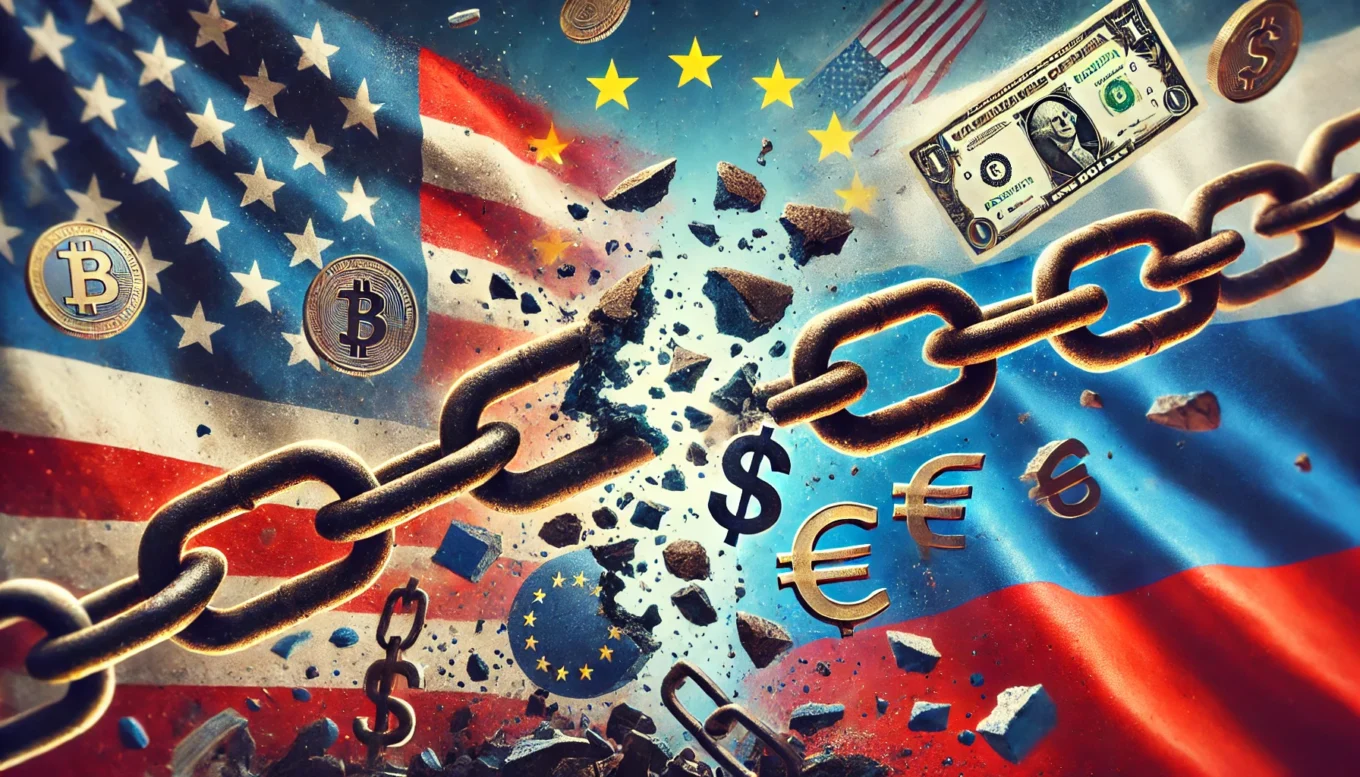Executive Summary
A potential rapprochement between the U.S. under a second Trump administration and Russia under Vladimir Putin could dramatically reshape the global economic landscape. With the EU recently adopting its 16th sanctions package against Russia, the sanctions regime has become an ingrained feature of the global economy. However, a peace deal or a de-escalation of hostilities in Ukraine could trigger a rollback of U.S. and possibly UK sanctions, creating significant implications for international competition, global finance, and economic growth. This briefing explores the potential scenarios and their impact on global markets.
1. Current Sanctions Landscape and Market Adaptation
Since the start of the Ukraine war in February 2022, the U.S., UK, and EU have imposed extensive sanctions on Russia, targeting:
- Energy Exports: Restrictions on Russian oil and gas, including price caps.
- Financial Sector: Disconnection of Russian banks from SWIFT, asset freezes, and bans on transactions.
- Technology & Defense: Restrictions on high-tech exports, semiconductors, and military-use goods.
- Oligarchs & Corporate Entities: Seizures of Russian assets and travel bans.
Despite these sanctions, Russia has adapted, forging stronger economic ties with China, India, and the Middle East. The global energy market has adjusted, with Russian oil and gas flowing to alternative buyers at discounted prices.
2. A Hypothetical Trump-Putin Peace Deal: Sanctions Rollback?
A second Trump presidency would likely seek a negotiated settlement to the Ukraine conflict, potentially leading to:
- Easing of U.S. Sanctions: Trump has previously expressed skepticism over the efficacy of sanctions and may favor lifting restrictions to re-engage Russia as a geopolitical counterweight to China.
- Pressure on the EU & UK to Follow Suit: The EU, deeply invested in its sanctions regime, may resist immediate rollbacks, but European businesses—especially in energy, finance, and manufacturing—could push for normalization.
- Potential Dissolution of the G7 Sanctions Unity: If the U.S. diverges from its European allies, sanctions enforcement could weaken, leading to a fragmented Western policy on Russia.
- Market Reopening: A peace deal could lead to the restoration of SWIFT access for Russian banks, re-entry of Russian commodities into global markets without restrictions, and the potential return of Western corporations to Russia.
3. Global Financial & Economic Implications
a) Energy Markets and Inflation Dynamics
- Oil Prices: If Western sanctions on Russian oil exports ease, global energy prices could stabilize or even decline. This could be particularly beneficial for emerging markets struggling with high energy costs.
- European Gas Markets: EU nations, which have diversified away from Russian gas, may face pressure to re-engage with Russian suppliers if cheaper energy alternatives are available.
- Inflation Control: Lower energy prices could reduce inflationary pressures in the U.S. and EU, giving central banks more flexibility to adjust interest rates.
b) The Competitive Landscape: Winners and Losers
- Western Energy Companies (ExxonMobil, BP, Shell): Could re-enter Russian markets, leading to new investment opportunities.
- Russian Energy Giants (Gazprom, Rosneft): Could regain lost market share in Europe, potentially reshaping the global energy trade.
- European Manufacturing & Agriculture: Could benefit from cheaper raw materials and fertilizers from Russia.
- Defense & Military Contractors: If hostilities end, demand for arms may decline, impacting companies reliant on defense contracts.
c) Geopolitical Realignments & Market Risks
- China’s Position: A U.S.-Russia rapprochement could diminish China’s leverage over Russia, reshaping the global power dynamic.
- Emerging Market Economies: Countries like India, Turkey, and the UAE, which have profited from trade arbitrage in sanctioned Russian goods, may see their strategic advantage diminish.
- U.S. Dollar Dominance: If sanctions ease, global reliance on alternative payment mechanisms (e.g., China’s CIPS or crypto solutions) could slow, reinforcing the dollar’s primacy in global trade.
4. Market Reactions & Investment Opportunities
a) Commodities & Energy
- Bullish for Oil & Gas: A Russian market comeback could bring investment opportunities in energy exploration and infrastructure.
- Metals & Rare Earths: Russian producers of aluminum, nickel, and palladium may return to full market access, influencing prices.
b) Financial Markets
- Banking & Payments: Restoring Russian banks to SWIFT could boost European financial institutions that have lost revenue streams due to sanctions.
- Russian Equities: If Western investors regain access to the Moscow Exchange, Russian stocks could surge.
c) Defense vs. Infrastructure
- Short-term Risks for Defense Stocks: If de-escalation leads to reduced military spending, stocks in companies like Lockheed Martin and Rheinmetall could see downward pressure.
- Infrastructure & Reconstruction: If post-war rebuilding efforts commence, investment opportunities in Eastern Europe and Russia could emerge, benefiting construction and engineering firms.
5. Key Takeaways for Investors
✅ Short-Term Volatility Likely: Markets may experience fluctuations as political negotiations unfold.
✅ Energy & Commodities Could Benefit: Loosening sanctions would favor oil, gas, and metals.
✅ European & U.S. Manufacturing Gains: Cheaper Russian inputs could enhance global competitiveness.
✅ Potential Dollar Strengthening: If sanctions rollback slows the de-dollarization trend.
✅ Defense Sector Caution: Peace prospects may temper investor enthusiasm for defense stocks.
Conclusion: A Potential Shift in Global Markets
The possibility of a U.S.-Russia rapprochement under a Trump administration presents a profound shift in global trade, finance, and geopolitics. While EU resistance to sanctions relief may persist, pressure from industries seeking stability could drive a gradual rollback. Investors should closely monitor geopolitical developments, energy markets, and financial sanctions policy to position themselves for potential shifts in international competition.
For now, the world has adapted to sanctions—but markets must prepare for the unexpected.






